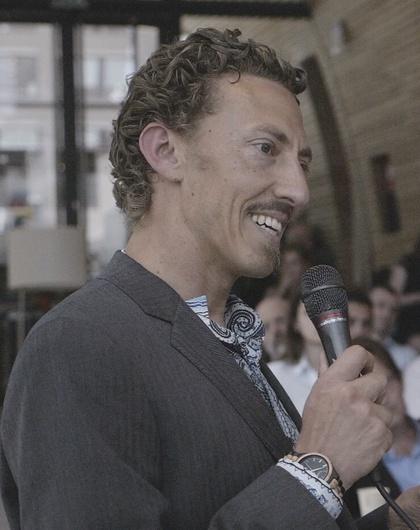Scholars
Yogi Hale Hendlin
Erasmus University Rotterdam
Based in
Netherlands
Europe
Yogi Hendlin is an environmental philosopher and public health scientist working on industrial epidemics – how the industrial model itself undermines democracy and subverts the rule of law. Hendlin argues that from extraction to disposal and everything in between, industrial processes systemically blind themselves to science and voices pointing out their ecological and social harms. Hendlin is a 2022 Brocher Foundation Fellow to complete writing a book on this topic, and has been working closely since 2006 with the UCSF Industry Documents Library.

Country(ies) of Specialty
United States NetherlandsFocus areas of expertise
Greenwashing Climate policy and politics History Fossil fuelsPublications
Articles
Reed G, Hendlin YH, Goldman G, Desikan A, MacKinney T, Berman E. 2021. “The Disinformation Playbook: How Industry Manipulates the Science Policy Process—and How to Restore Scientific Integrity.” Journal of Public Health Policy
Hendlin YH. 2021. “Surveying the Chemical Anthropocene: Chemical Imaginaries and the Politics of Defining Toxicity.” Environment & Society, 12: 181-202
Hendlin YH. 2021. “Colony Collapse and the Global Swarm to Save the Bees: Sacred Relations with Bees.” World Futures
Hendlin YH. 2021. “Plant Philosophy and Interpretation: Making Sense of Contemporary Plant Intelligence Debates.” Environmental Values
Hendlin YH. 2021. “The Law of the Excluded Middle: Discourse as casualty of the post-truth extremist response to the coronavirus pandemic.” Law, Culture & the Humanities
Hendlin YH, Arcuri A, Lepenies R, Hüesker F. 2020. “Like Oil and Water: The Politics of (Not) Assessing Glyphosate Concentrations in Freshwater.” European Journal of Risk Regulation
van Kleef RC, Ravesteijn B, Van Kippersluis H, Hendlin, YH. (2020) „Oproep aan zorgverzekeraars: Experimenteer met ‘verschoven’ eigen risico.“ VGE Bulletin, 37(1): 28-30.
Hendlin YH. 2020. “The Ensemblist Nature of Plant Plurality.” Semiotic Review. April
Hendlin YH. 2020, journal backdated to 2018. “Interspecies Signaling and Habituated Conviviality.” Recherches sémiotiques / Semiotic Inquiry. 39(2): 19-38
Hendlin YH, Vora M, Elias J, Ling PM. 2019. “Financial Conflicts of Interest and Stance on Tobacco Harm Reduction: A Systematic Review.” American Journal of Public Health, 109(7):1-8
Hendlin YH, Bialous SA. 2019. “The Environmental Externalities of Tobacco Manufacturing: A review of tobacco industry reporting.” Ambio, March 13:1-18
Hendlin YH. 2019. “Environmental Justice as a (potentially) Hegemonic Concept: A historical look at competing interests between the MST and indigenous peoples in Brazil.” Local Environment, 24(2):113-128
Hendlin YH. 2018. “I am a Strange Loop: The effects of advertising-based artificial selection.” Biosemiotics. 12(1):131-156.
Elias J, Hendlin YH, Ling PM. 2018. “Public versus Internal Conceptions of Addiction: An Analysis of Internal Philip Morris Documents.” PLOS Medicine. 15(5): e1002562
Tønnessen M, Beever J, Hendlin YH. 2017. “Introducing Biosemiotic Ethics.” Zeitschrift für Semiotik, 37(3-4):3-12
Hendlin YH. 2017. “Zwischenartliche Ethik: Der Modus Vivendi des zwischenlebewesen Milieus.” Zeitschrift für Semiotik, 37(3-4):71-94
Hendlin YH, Ott K. 2016. “Habermas on Nature: A Postnormal Reading Between Moral Intuitions and Theoretical Restrictiveness.” Environmental Ethics, 38(2):183-208
Hendlin YH. 2016. “Multiplicity and Welt.” Sign System Studies, 44(1-2):94-110
Hendlin YH. 2014. “The Threshold Problem in Intergenerational Justice.” Ethics and the Environment, 19(2):1-38
Hendlin YH. 2014. “From Terra Nullius to Terra Communis: Reconsidering Wild Land in an Era of Conservation and Indigenous Rights.” Environmental Philosophy, 11(2):141-174
Kennedy A, Sullivan S, Hendlin YH, Barnes RL, Glantz SA. 2012. “Strong Tobacco Control Program Requirements and Secure Funding Are Not Enough: Lessons From Florida.” American Journal of Public Health, 102(5):807-17
Tung G, Hendlin YH, Glantz SA. 2009. “Competing Initiatives: A New Tobacco Industry Strategy to Oppose Statewide Clean Indoor Air Ballot Measures.” American Journal of Public Health, 99(3):430-439


